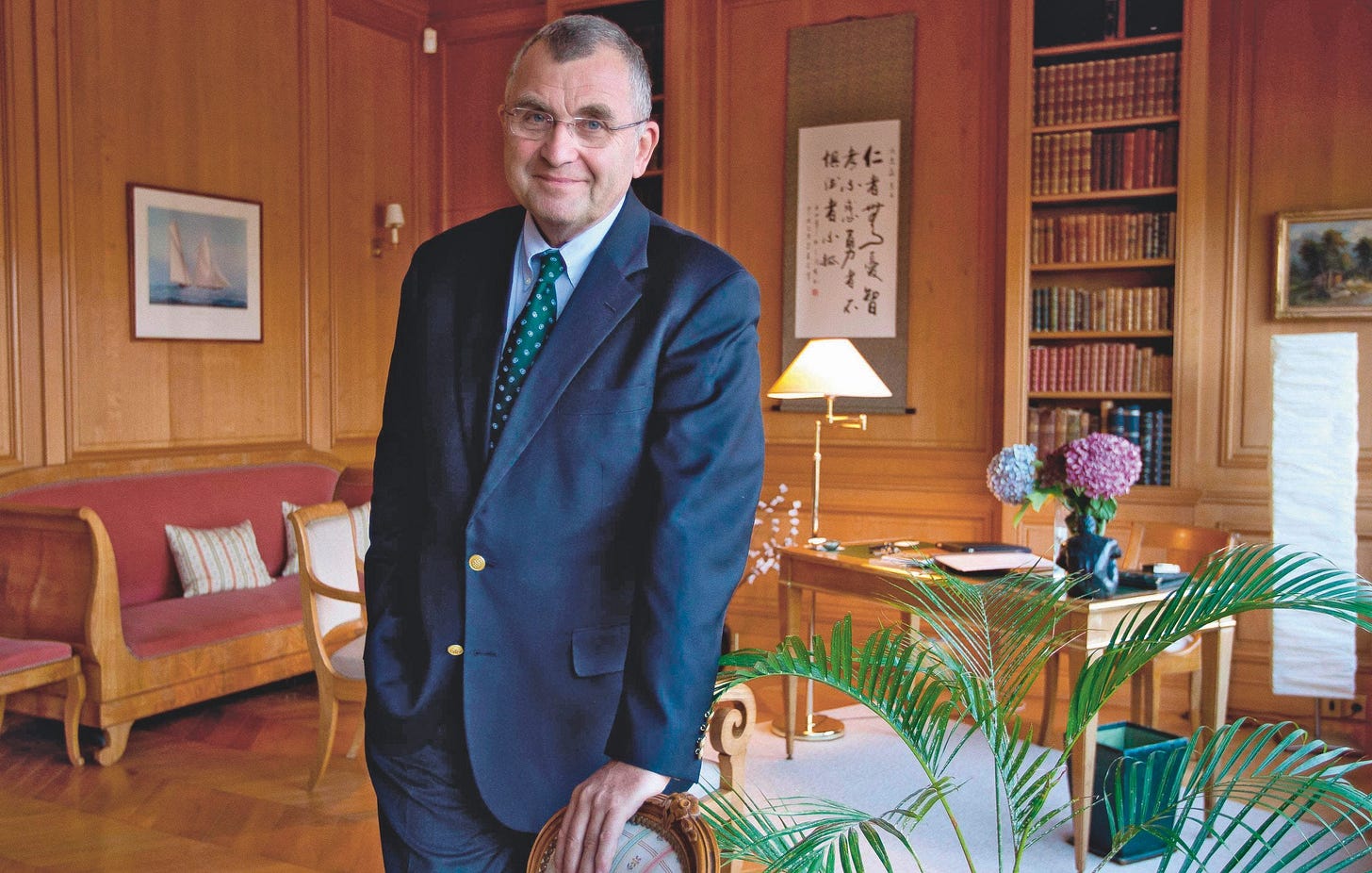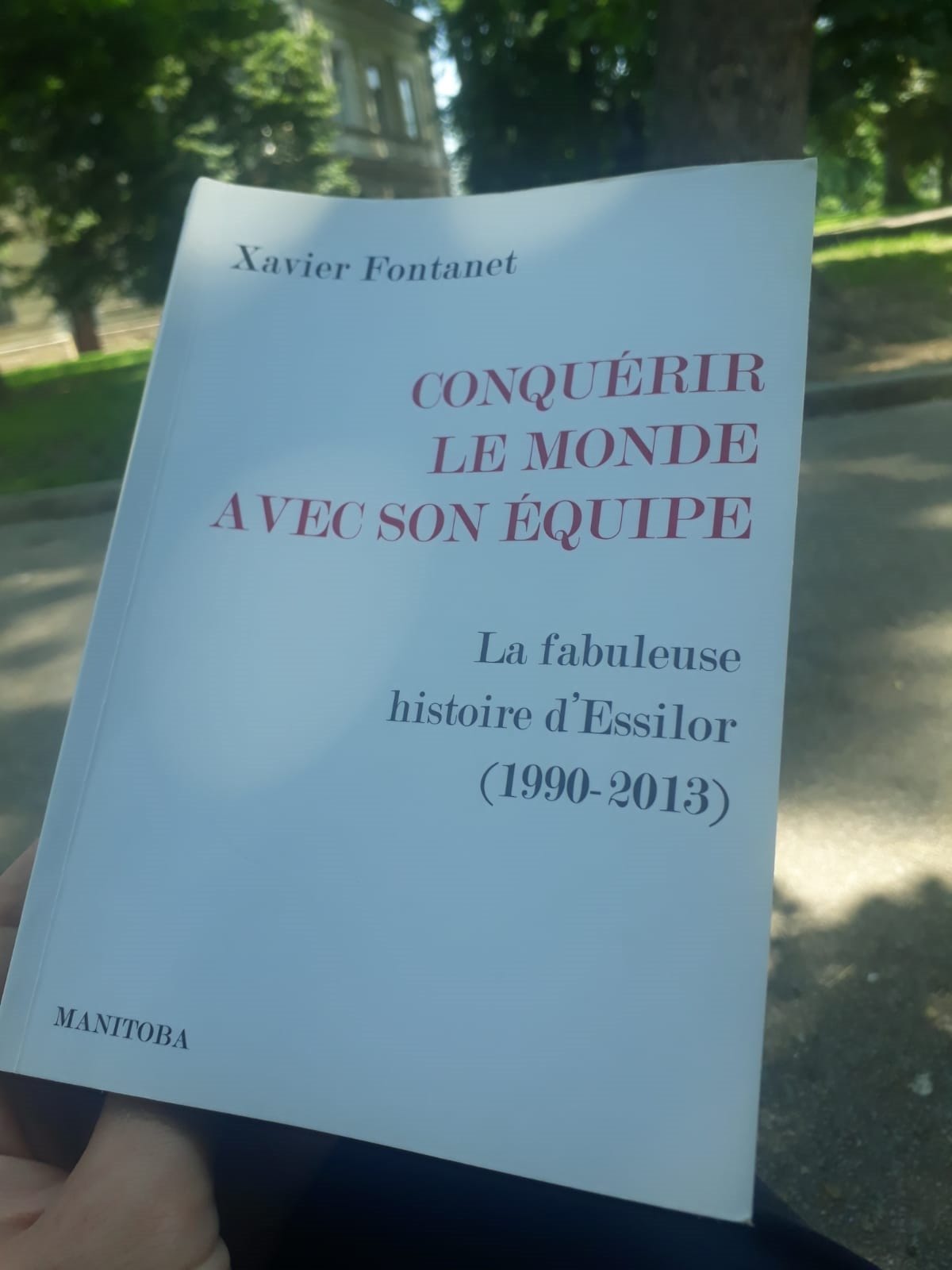"Business is the best way to get to know other cultures"
Interview with Xavier Fontanet on his book "Conquering the world with your team"
Dear Readers,
today we delve into one of France's most remarkable industrial success stories of recent decades. Xavier Fontanet was the CEO of Essilor from 1991 to 2010: in 20 years, he and his team transformed this French SME into a global leader in spectacle lenses. In Conquérir le monde avec son équipe (Conquering the world with his team), the CEO explains Essilor's development and its conquest of the world's major markets (United States, Japan, China, Korea, etc.). He looks back on his international experiences and shares with us the lessons of this success.
In 2018, Essilor merged with Luxottica, an Italian eyewear manufacturer, creating a conglomerate with a turnover exceeding 20 billion euros.
Xavier Fontanet is now a professor of strategy at HEC Business School and hosts a weekly show on BFM Business (a French TV channel) devoted to corporate strategy. We met in a Parisian café in December: the following interview captures our conversation.
Guillaume Gau: In “Conquering the world with your team”, you write that business is the best way to get to know other cultures. Can you tell me more about this?
Xavier Fontanet: Indeed, that's my conviction. Launching a business in a foreign market means building relationships of trust with the locals and showing a great deal of humility in understanding the local culture.
Let me give you a few examples: to establish Essilor in Japan, we created a joint venture (a joint subsidiary) with Nikon. This Japanese manufacturer, known for its cameras, also makes spectacle lenses. Over the years, I've developed an understanding of Japanese culture through regular visits to the archipelago and daily contact with Japanese teams. There are many cultural specificities: for example, you must never criticise in public, or make a colleague lose face in front of his colleagues. It's a fundamental aspect of Japanese identity, a question of honour. If you want to disagree, do it in the evening, after a few drinks. I've also noticed that the Japanese can be paralysed by difficult situations. It's the opposite for the French: thanks to their Cartesian and creative minds, they're very good at working in a mess or when their backs are against the wall. On the other hand, when the situation has stabilised, it's difficult to do better than the Japanese in terms of excellence.
On the differences between Japanese and Western identity, read this interview with a French-speaking Japanese historian I conducted last summer:
Another people who impressed me were the Koreans: they are masters at simplifying manufacturing processes. It's not surprising that they have succeeded in creating global industrial leaders like Samsung and Hyundai.
In China, the authorities have always welcomed Essilor's investments because they understood one thing: better eyesight means better labour productivity. For them, it was fundamental that the working population should be well equipped with eyewear to support the country's industrial take-off.
In Europe, the Germans and the Swiss have a real industrial culture and an innate sense of quality. This can be explained by their education systems, which promote apprenticeships, technical training and links with business. This is one of the reasons why these two countries have not undergone deindustrialization: unlike France, the crazy idea of a society without factories could not germinate there.
“Launching a business in a foreign market means building relationships of trust with the locals and showing a great deal of humility in understanding the local culture” Xavier Fontanet
G.G.: You and your team have transformed Essilor into an industrial leader, prevailing in the most competitive global markets against formidable Japanese, American, and German competitors. What are the reasons behind this success?
X.F.: I identify three main reasons.
Firstly, it's the innovation and quality of our products. Essilor pioneered two fundamental inventions: progressive lenses, allowing presbyopes (who represent 40% of the global population) to see clearly at all distances, and organic lenses (previously, glasses used the same glass as our windows). These technological advancements have enabled hundreds of millions of people to see better. Our relentless pursuit of innovation has driven growth levels exceeding 10% annually. We've also tailored lenses to populations; for instance, while most Chinese people are nearsighted and require thick lenses, Indians have shorter eyes and tend to become presbyopic.
Secondly, having a solid strategy for the company is crucial; otherwise, you won't have followers. Moreover, it's essential that employees understand and share it: I spent most of my time explaining the strategy at all levels of the company. The direction must be clear. From this shared strategy stems a fundamental element in a company's success: trust. Once trust is established, everything becomes easier and less contentious. The night before battles, Napoleon would explain the strategy for the next day to his soldiers. They felt valued, thus motivated.

Lastly, there's employee stock ownership. Essilor has implemented an extremely proactive policy to turn its collaborators, more than mere employee-shareholders, into employee-shareholders. When your team becomes employee-owners, everything changes. Your collaborators transform into highly engaged businessmen deeply invested in the company's success. And this ownership wasn't limited to executives: some workers could retire with windfalls of €200,000, the value of their accumulated shares at Essilor. It provides a more serene retirement! At Essilor, with unions, I discussed more about purchasing shares conditions (terms for employees acquiring company shares) than salary increases.
G.G.: France is currently attempting to reindustrialize. What is your analysis of the situation, and what do you propose?
X.F.: While the situation has improved somewhat in recent years, French industry still bears a fiscal burden that undermines its competitiveness. For instance, even with recent reductions, production taxes remain on average twice as high as in the rest of Europe. Beyond the fiscal burden, there's also bureaucratic red tape: companies must allocate increasing resources to deal with administrative complexity. These resources could be invested elsewhere, such as in innovation. The impact is tangible because a company's strategy is how it allocates its human and financial resources across different arenas, whether geographical or technological.
More broadly, excessive public spending translates into production costs. This is what I call the "Fontanet theorem": the more bloated your public sector, the higher your production costs. The cost of the public sector has to end up somewhere; inevitably, it falls back onto the productive sector.
Simplification, lower taxation, and of course, innovation, these are the three priorities for reindustrializing France.
Find below my annual study on attractiveness and the battle for mega-factories in Europe:
G.G.: Finally, do you have any books to recommend?
X.F.: I recommend From Third World to First by Lee Kuan Yew. He led Singapore for 30 years and turned this small trading post on the Malay Peninsula into one of the most prosperous city-states in the world. In this book, he explains his strategy based on attractiveness and innovation. I met him several times because we were hesitating between Hong Kong and Singapore for Essilor's Asian headquarters. He wanted to make his city an industrial and financial hub, so he rolled out the red carpet for us. The advantage of Singapore is that you can oversee operations in both India and China simultaneously. Hong Kong is too focused on China.
In French, I recommend Du Miracle en économie by Alain Peyrefitte, a writer and minister under de Gaulle and Pompidou. In this work, he analyzes the economic success of England, the Netherlands, or Japan. He highlights the fundamental role played by trust in the development of these countries: by creating social harmony, trust enables the actors in a society to collaborate and project themselves into the future. Whether for a country or a company, trust is a fundamental element of success. But it cannot be decreed: you must know how to create the conditions for its emergence.
G.G.: Thank you for this insightful conversation!
X.F.: My pleasure! Feel free to check out my show on BFM Business's page: you can find over 200 episodes dedicated to corporate strategy there.
Find all previous articles from Why the West on the homepage of the website. You can also follow me on X (ex-twitter).







